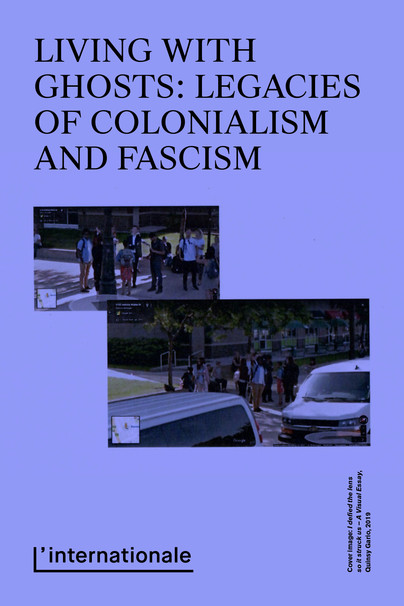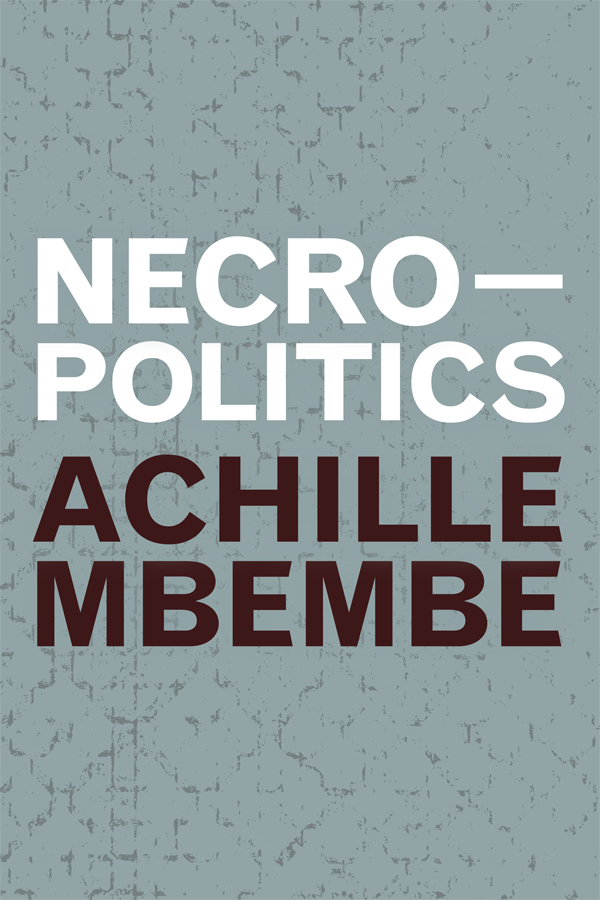L’Internationale (eds.): Living with Ghosts: Legacies of Colonialism and Fascism (2019)
Filed under book | Tags: · colonialism, fascism, nationalism, politics, populism, racism

“Living with Ghosts: Legacies of Colonialism and Fascism is a constellation of essays, conversations and images that point to the manner in which the legacies of colonialism and fascism reverberate in our present conjuncture. The impulse for producing this issue was a question of whether it may be possible to trace the connections between the violences of the colonial project through the horrors of fascism to current forms of racism, identitarianism and populism – what we initially called ‘an arc’ of colonialism-nationalism-fascism.
These shifts are palpable in the contemporary political uncertainties expressed in this collection of texts. Each of the contributors reflect on the specificities of their environment through their lived experiences, through their artistic practices, or reflections on the curatorial climate. They seek to maintain a space for critical engagement and political criticism. Furthermore, this issue considers the layers of historical conditions that inform states of ‘belonging’ and ‘sovereignty’ (even ‘citizenry’ as a debatable proposition) in Europe. What becomes evident from these various contributions is that there is no sudden or surprising development towards the right – too often expressed an ‘inexplicable phenomena’ of contemporary society. They instead address it as a slow and steady movement based on historical events and political terms of reference which have remain unresolved and have again returned, this time through the opportunism advanced and fuelled by the structures of capitalism that connect Europe to Russia and America. Each is a case study that recognises the patterns of violence and inequality evident in the political structures of colonialism and fascism.”
With contributions by Nick Aikens, Jyoti Mistry, and Corina Oprea, Gurminder K.Bhambra, Rex Edmunds and Elizabeth A. Povinelli, Gloria Wekker, Quinsy Gario, Nkule Mabaso, Jyoti Mistry, Jelena Vesić, and Kuba Szreder.
Edited by Nick Aikens, Jyoti Mistry, Corina Oprea
Publisher L’Internationale Online, 2019
Creative Commons BY-NC-SA License
ISBN 9789151931685
190 pages
Achille Mbembe: Necropolitics (2016–) [ES, IT, EN]
Filed under book | Tags: · biopolitics, critical theory, fascism, nationalism, necropolitics, philosophy, race, racism, theory

“In Necropolitics Achille Mbembe, a leader in the new wave of francophone critical theory, theorizes the genealogy of the contemporary world, a world plagued by ever-increasing inequality, militarization, enmity, and terror as well as by a resurgence of racist, fascist, and nationalist forces determined to exclude and kill. He outlines how democracy has begun to embrace its dark side—what he calls its “nocturnal body”—which is based on the desires, fears, affects, relations, and violence that drove colonialism. This shift has hollowed out democracy, thereby eroding the very values, rights, and freedoms liberal democracy routinely celebrates. As a result, war has become the sacrament of our times in a conception of sovereignty that operates by annihilating all those considered enemies of the state. Despite his dire diagnosis, Mbembe draws on post-Foucauldian debates on biopolitics, war, and race as well as Fanon’s notion of care as a shared vulnerability to explore how new conceptions of the human that transcend humanism might come to pass. These new conceptions would allow us to encounter the Other not as a thing to exclude but as a person with whom to build a more just world.”
First published as Politiques de l’inimitié, La Découverte, Paris, 2016.
English edition
Translated by Steven Corcoran
Publisher Duke University Press, 2019
Theory in Forms series
ISBN 9781478005858, 1478005858
viii+213 pages
Reviews: Laurent Husson (Érudit, 2017, FR), Magali Bessone (L’Homme, 2016, FR), Guillaume G. Poirier (Ithaque, 2017, FR), Alexis Pierçon-Gnezda (Les Inrocks, 2016, FR), Jean Vettraino (Revue Projet, 2016, FR), Akono François-Xavier (Philosophie-politique, 2016, FR), Klaus Nüchtern (Zeit, DE, 2017), Jos Schnurer (socialnet.de, 2017, DE), Filippo La Porta (Laterza, 2019, IT), Tancredi Re (Economia Italiana, 2019, IT).
Políticas de la enemistad (Spanish, trans. Victor Goldstein, 2018, via)
Nanorazzismo: il corpo notturno della democrazia (Italian, trans. Guido Lagomarsino, 2019)
Necropolitics (English, trans. Steven Corcoran, 2019)
Jeffrey Herf: Reactionary Modernism: Technology, Culture, and Politics in Weimar and the Third Reich (1985)
Filed under book | Tags: · engineering, enlightenment, fascism, germany, marxism, modernism, national socialism, nationalism, nazism, politics, romanticism, technology, weimar republic

“In a unique application of critical theory to the study of the role of ideology in politics, Jeffrey Herf explores the paradox inherent in the German fascists’ rejection of the rationalism of the Enlightenment while fully embracing modern technology. He documents evidence of a cultural tradition he calls ‘reactionary modernism’ found in the writings of German engineers and of the major intellectuals of the Weimar right: Ernst Juenger, Oswald Spengler, Werner Sombart, Hans Freyer, Carl Schmitt, and Martin Heidegger. The book shows how German nationalism and later National Socialism created what Joseph Goebbels, Hitler’s propaganda minister, called the ‘steel-like romanticism of the twentieth century’. By associating technology with the Germans, rather than the Jews, with beautiful form rather than the formlessness of the market, and with a strong state rather than a predominance of economic values and institutions, these right-wing intellectuals reconciled Germany’s strength with its romantic soul and national identity.”
Publisher Cambridge University Press, 1985
ISBN 0521338336, 9780521338332
251 pages
Reviews: R.J. Overy (English Historical Review), Geoff Eley (Telos).
Commentary: Thomas Rohkraemer (Contemporary European History).

